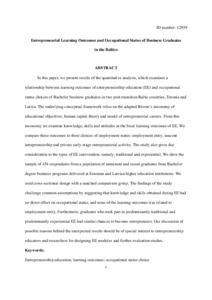Entrepreneurial Learning Outcomes and Occupational Status of Business Graduates in the Baltics (konferenssiabstrakti)
Anna Rebmann; Inna Kozlinska; Tõnis Mets
https://urn.fi/URN:NBN:fi-fe2021042718052
Tiivistelmä
In this paper, we present results of the quantitative analysis, which examines
a relationship between learning outcomes of entrepreneurship education (EE) and
occupational status choices of Bachelor business graduates in two
post-transition Baltic countries, Estonia and Latvia. The underlying conceptual
framework relies on the adapted Bloom’s taxonomy of educational objectives,
human capital theory and model of entrepreneurial careers. From this taxonomy
we examine knowledge, skills and attitudes as the focal learning outcomes of EE.
We compare these outcomes to three choices of employment status: employment
entry, nascent intrapreneurship and private early-stage entrepreneurial
activity. The study also gives due consideration to the types of EE
intervention, namely, traditional and experiential. We drew the sample of 454
respondents from a population of imminent and recent graduates from Bachelor degree
business programs delivered at Estonian and Latvian higher education
institutions. We used cross-sectional design with a matched comparison group.
The findings of the study challenge common assumptions by suggesting that
knowledge and skills obtained during EE had no direct effect on occupational
status, and none of the learning outcomes was related to employment entry. Furthermore,
graduates who took part in predominantly traditional and predominantly experiential
EE had similar chances to become entrepreneurs. Our discussion of possible
reasons behind the unexpected results should be of special interest to
entrepreneurship educators and researchers for designing EE modules and further
evaluation studies.
Kokoelmat
- Rinnakkaistallenteet [19207]
